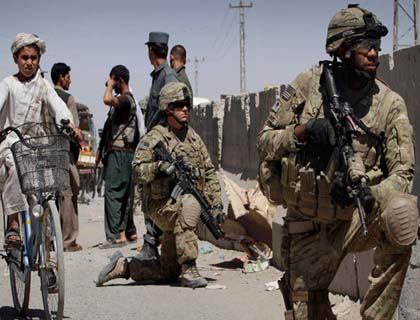WASHINGTON - Ten years after the United States embarked on a war against terrorism in the rubble of the September 11 attacks, the country finds itself financially exhausted and facing hard strategic choices as it grapples with new budget realities.
After spending heavily for a decade on the wars in Iraq and Afghanistan, the Pentagon now faces potential cuts of up to nearly $1 trillion over 10 years at a time when it sees rising competition from countries like China and a need to replace its fleet of aging planes and ships.
While some lawmakers are promising to act to avert the heaviest of the budget cuts, Todd Harrison, an analyst at the Center for Strategic and Budgetary Assessments, says postwar cost-cutting of 25 percent to 50 percent has been the norm since the Korean War. That means something has to give.
"Given the budget outlook we see in the coming years, it's simply not realistic for DoD (Department of Defense) to continue to do all of the things it does today with fewer and fewer resources," Harrison told a briefing this week on the impact of the September 11 attacks.
"This means we will need to make a number of strategic choices about how and where we plan to compete in the future," he said. "And these choices will have to be constrained by the resources available."
As the United States marks the 10th anniversary of the attacks on New York and Washington, analysts say September 11 and the ensuing wars in Afghanistan and Iraq have had a profound impact on the way the Pentagon fights and views the threats it is likely to face in the future.
"I think for the Department of Defense it (September 11) really was a watershed event," said Jim Thomas, another analyst with the CSBA. "I don't think it struck people immediately ... but as we look at the cumulative effect over the past decade, I think we can say in retrospect that it truly was."
In Iraq and Afghanistan, the military has increasingly emphasized shadowy special operations strikes instead of major set-piece battles.
With less than 1 percent of the population in uniform, the United States went to war undermanned and backed by an army of defense contractors, a move that has cemented close ties between the industry and the military.
"It had a profound effect," Northrop Grumman Corp (NOC.N) Chief Executive Wes Bush said of the September 11 attacks. "And it had a profound effect in many dimensions."
The rush of patriotism that followed the attacks led many young college graduates to seek careers in the defense industry, reshaping the demographics of companies like Northrop, Bush told the Reuters Aerospace and Defense Summit this week.
"Many of our employees spend every day working side by side with service members," Bush said. "(September 11) has, I would say, increased the sense of shared mission, shared responsibility."
The attacks also marked a shift in U.S. economic fortunes. Before al Qaeda operatives slammed hijacked planes into the World Trade Center in New York and the Pentagon near Washington, budget officials had projected surpluses that would have virtually eliminated the federal debt over the course of the decade.
Instead, tax cuts and war spending led Washington to rack up a string of deficits that have added $6.1 trillion to the national debt, pushing it to $14.3 trillion, or about $46,500 for every man, woman and child in the country.
Pentagon spending over the decade rose from about $400 billion annually to nearly $700 billion in inflation-adjusted dollars, even though the overall size of the armed forces remained roughly the same, Harrison said.
In addition to war spending, the Pentagon paid more for personnel and saw the cost of its day-to-day operations rise. The services also spent $50 billion on developing weapons systems that were never actually produced.
"We canceled programs knowing that we will need to start a replacement program to do essentially the same thing," Harrison said. "Now, we will have fewer resources available in the coming years to do that."
Under the debt-reduction agreement signed by President Barack Obama in August, the Defense Department is working to cut $350 billion from its projected spending over the next 10 years.
The Pentagon could face another $600 billion in automatic across-the-board spending cuts unless a congressional super committee agrees on alternatives by the end of the year to reduce the federal deficit.
Defense Secretary Leon Panetta and the Pentagon's top uniformed personnel have warned that the first round of cuts is proving difficult. A second round would be disastrous, they say, and would increase the risk to national security.
Defense industry leaders acknowledge the need for some cuts in defense spending, but they warn that in the current tough economic environment, reductions will jeopardize the jobs and innovation needed for further growth and expansion.
"We understand the urgency of wanting to focus on reducing deficits that exceed a trillion dollars," Lockheed Martin Corp (LMT.N) Chief Executive Robert Stevens told the Reuters Summit. "Our preference would be that we align national security resources to national security challenges and not have it a function of an automatic budget reduction." (Reuters)

